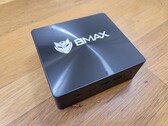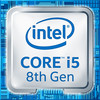
Intel Core i5-8260U

Der Intel Core i5-8260U ist ein sparsamer Quad-Core-SoC für Notebooks und Ultrabooks, der auf der Cofffee-Lake-Architektur basiert und Ende August 2019 vorgestellt wurde. Im Vergleich zum Kaby Lake basierenden i5-8250U, bietet der 8260U einen höheren Turbo von 3,9 versus 3,4 GHz und wird im verbesserten 14nm Prozess gefertigt (14nm++ vs 14nm+).
Architektur
Im Vergleich mit Skylake hat Intel die zugrundeliegende Mikroarchitektur praktisch unverändert übernommen, sodass sich keine Unterschiede in der Pro-MHz-Leistung ergeben. Überarbeitet wurde lediglich die Speed-Shift-Technik zur schnelleren dynamischen Anpassung von Spannungen und Taktraten, zudem gestattet der gereifte 14-Nanometer-Prozess deutlich höhere Frequenzen und eine bessere Energieeffizienz als bislang.
Performance
Mit 1,6 bis 3,9 GHz taktet der Core i5-8260U beim maximalen Boost deutlich höher als der i5-8250U und kann daher in der Einzelkernleistung etwas punkten. Spannend ist jedoch ob und wie lange die Performance gehalten werden kann (Stichwort Throttling). Dies ist stark vom eingesetzten Kühlsystem der Laptops abhängig. Dadurch empfiehlt es sich die Cinebench R15 Leistungsdiagramme über Zeit in unseren Notebooktests zu konsultieren.
Grafikeinheit
Die integrierte Intel UHD Graphics 620 ist laut Intel identisch zur Intel HD Graphics 620 (z.B. im Core i5-7200U). Sie verfügt wie die alte HD Graphics 520 über 24 Ausführungseinheiten (EUs) und taktet etwas höher wie die Vorgängerkarten (300 - 1.100 versus 1.000 MHz). Die Performance hängt stark vom verwendeten Arbeitsspeicher ab; mit schnellem DDR4-2133 im Dual-Channel-Betrieb kann sie sich mit einer dedizerten Nvidia GeForce 920M messen.
Anders als Skylake kann Coffee Lake / Kaby Lake nun auch H.265/HEVC im Main10-Profil mit 10 Bit Farbtiefe sowie Googles VP9-Codec in Hardware decodieren.
Leistungsaufnahme
Die Fertigung erfolgt im erneut verbesserten 14-Nanometer-Prozess (14nm++, 3. Generation) mit FinFET-Transistoren. Der TDP ist weiterhin ULV-typisch mit 15 Watt spezifiziert und kann je nach Einsatzzweck zwischen 10 und 25 Watt variiert werden.
| Codename | Coffee Lake |
| Serie | Intel Coffee Lake |
| Taktung | 1600 - 3900 MHz |
| Level 1 Cache | 256 KB |
| Level 2 Cache | 1 MB |
| Level 3 Cache | 6 MB |
| Anzahl von Kernen / Threads | 4 / 8 |
| Stromverbrauch (TDP = Thermal Design Power) | 15 Watt |
| Herstellungstechnologie | 14 nm |
| Socket | FCBGA1528 |
| Features | Dual-Channel DDR4 Memory Controller, HyperThreading, AVX, AVX2, Quick Sync, Virtualization, AES-NI |
| GPU | Intel UHD Graphics 620 (300 - 1100 MHz) |
| 64 Bit | 64 Bit wird unterstützt |
| Architecture | x86 |
| Anfangspreis | $297 U.S. |
| Vorgestellt am | 21.08.2019 |
| Produktinformationen beim Hersteller | www.intel.com |
Benchmarks
* Smaller numbers mean a higher performance
Testberichte für den Intel Core i5-8260U Prozessor



